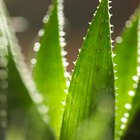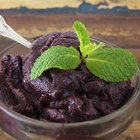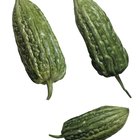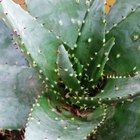
Laboratory studies show that noni fruit and its juice, derived from an evergreen shrub that grows widely throughout tropical regions of the Pacific Basin, have a wide array of potentially significant medicinal properties, according to the National Center for Complementary and Alternative Medicine. Several of these characteristics, including the juice’s analgesic, antioxidant and anti-inflammatory properties, can promote overall skin health and ease the symptoms of specific skin disorders.
Essential Fatty Acids
Sadly lacking in the diets of many Americans, essential fatty acids play an important role in the health of both skin and hair. James D. Krystosik, a practicing chiropractic physician and author of “Carbs from Heaven, Carbs from Hell,” points out that noni juice is rich in these nutritionally important fatty acids, which are the building blocks of fats and oils in the body. According to an article on the website of naturopathic doctor Anthony Speroni, these acids help to keep skin healthy by promoting the efficient functioning of cell membranes. This allows all cells to more readily absorb the nutrients they need while also flushing out the toxins that interfere with optimal cell function.
Other Nutrients
In addition to its high content of essential fatty acids, noni juice possesses a wide array of medicinal properties and nutrients that are beneficial not only for the skin but for general health as well. In explaining the wide use of noni juice in Polynesian folk medicine, Michael Tierra, herbalist and author of “The Way of Herbs,” identifies its medicinal properties as antibacterial, antimicrobial, immune-stimulating, antioxidant, antihypertensive, antiarthritic, analgesic, anti-inflammatory and antiparasitic.
Perhaps key to noni juice’s ability to promote skin cell health is its high content of proxeronine, according to Rita Elkins, research specialist and author of “The Noni Revolution.” Proxeronine is believed to promote production of xeronine, a compound that not only keeps cells healthy but also helps to steer abnormal cells back to normalcy. According to Elkins, the late Dr. Ralph Heinicke, a biochemist at the University of Hawaii, theorized that noni juice’s effect on the body’s production of xeronine helps to explain why noni juice “can be beneficial for so many seeming unrelated disorders.”
Topical Use for Skin Disorders
Scot C. Nelson, Ph.D., and Craig R. Elevitch, authors of “Noni: The Complete Guide for Consumers and Growers,” report that full-strength noni juice, applied topically, can be helpful in treating dermatitis of the face and scalp. These forms of dermatitis often develop in older people whose skin has been dried out by excessive exposure to sunlight. Apply juice to affected areas of the skin. Allow it to sit for 10 to 15 minutes, and then rinse it off with fresh water.
Related Articles

The Use of Neem Juice in Skin Care as ...

Pomegranate Juice & Acne

What Juices Are Good for Healing Acne ...

Does Aloe Vera Juice Treat Skin Cancer?

How to Use Wheatgrass for Washing Hair

Acai Berry & Acne

What Are the Benefits of Aloe Vera & ...

Are There Ways to Get Rid of Blocked ...

How Long Will Pineapple Juice Stay Good ...

Bitter Melon for Acne

Where to Buy Pomegranate Juice

What Juices Are Good for Healing Acne ...

Is No Sugar Added Cranberry Juice Good ...

Aloe Vera & Seborrheic Dermatitis

Nutrition Information on Blueberries

Glucosamine: Skin Benefits

What Does Kigelia Fruit Extract Do for ...

Grapefruit Skin Benefits

How to Reduce Acne Inflammation

Juicing for Wrinkles
References
- “Carbs from Heaven, Carbs from Hell”; James D. Krystosik; 2004
- “The Way of Herbs”; Michael Tierra; 1998
- “The Noni Revolution”; Rita Elkins; 2002
- “Noni: The Complete Guide for Consumers and Growers”; Scot C. Nelson and Craig R. Elevitch; 2006
Resources
Writer Bio
Don Amerman has spent his entire professional career in the editorial field. For many years he was an editor and writer for The Journal of Commerce. Since 1996 he has been freelancing full-time, writing for a large number of print and online publishers including Gale Group, Charles Scribner’s Sons, Greenwood Publishing, Rock Hill Works and others.
Photo Credits
noni 3 image by serge simo from Fotolia.com